Spring isn’t just a season for new growth, it's also when car and truck makers start signaling what’s coming next. Here's what we know for sure about the best trucks of 2023 and 2024: With more innovation and variety hurtling into the market faster than any other point in automotive history, it's the perfect moment to be a truck buyer.
If you’re in the market for a new sled, here's a fistful of savvy perspective on some of the best pickup, electric, hybrid, and off-road trucks for sale right now—plus an exciting teaser on what's right around the corner.
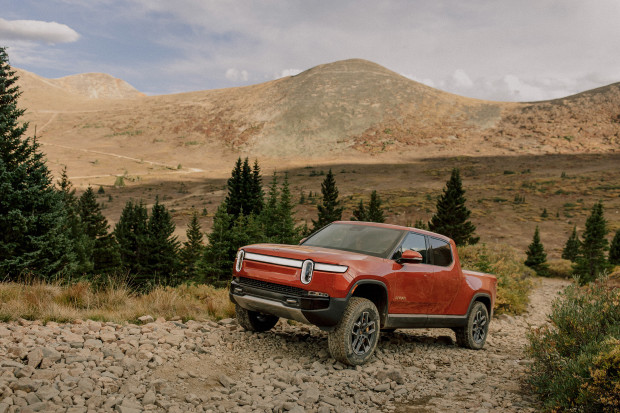
Courtesy Image
Coolest Tech: Rivian R1T
Why isn't the Ford Lightning isn’t in this spot? The answer's pretty simple: Rivian’s innovations are pushing the needle on every other carmaker, let alone truck brand. It's today’s Tesla, and despite some hiccups along the way, Rivian has busted the mold making its EVs.
How's it doing this? By thinking like gearheads. For example, Rivian R1T has options like a sliding power cover over the bed that accordions out of the way at the touch of a button—rather than some awkward contraption that saddles the owner with either riding around with the bed covered (and largely useless) or open.
Other Rivian features include an air compressor, which is useful for inflating air mattresses as well as airing up the tires you’d soften for off-roading. There's a center gear tunnel behind the cab and ahead of the bed that can deploy a camp kitchen with a two-burner stove, sink, and is piped from an onboard water tank. And let's not forget the Bluetooth speaker that’s synced to the sound system or your phone.
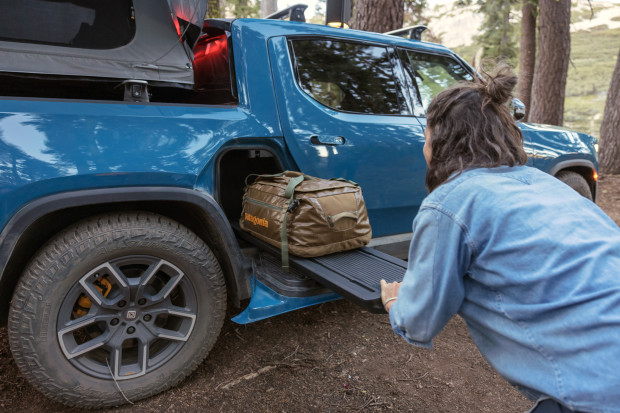
Courtesy Image
Even the roof rack can plug into slots over the cab or into rails over the bed. Removal takes seconds, because designers didn’t just accept what was offered in the aftermarket. They insisted on unique feet that pop directly into their own rails, so the rack could be stowed instantly when not in use—and those rails close up when not in use, too, preserving aero and range.
Better yet, because Rivian has an air suspension, the company rolled out “camp mode” that auto levels the truck on almost any ground. Throw a rooftop tent onto the bed and you’re not sleeping cockeyed. Genius!
Related: Rivian R1S Is the Most Lustworthy SUV Debut of the Last Decade
All this might sound rather Tesla-esque. It’s not, because Rivian neither thinks “outside the box” for its own sake nor brags about doing stuff differently just to thumb their noses at the hidebound car industry. In fact, much truck-level innovation here pays homage to the luxury car space. For instance, electronically damped air suspension allows extraordinary cornering limits, yet R1T doesn’t have a brittle ride. It’s a lot more like bombing around in an S-Class Benz. Even the excellent Ford Lightning isn’t quite this smooth.
Speaking of which, R1T can obliterate 60 mph in a mere 3.3 seconds—though in an age when everything electric boasts g-bending passing power, the more extraordinary trick is Rivian’s ability to make R1T drive good-naturedly. While Tesla proved you could deliver a stiff ride, Rivian is proving that a truck that can lift to 15 inches of ground clearance at the push of a button can pussycat through town rather than handle like the thick-chested brutes of yesteryear.
Are there aspects to like less? Sure, a 4.5-foot bed is more toy truck than contractor friendly. Also, while Rivian's 314-mile range is great, its 70 mpge (the electric equivalent of a gallon of gas) woefully trails EV hatches and sedans that achieve 100 mpge or more.
For all that, the innovation is exceptional, and industry watchers expect Rivian’s next move into smaller crossovers to be equally game changing.
[$73,000; rivian.com]
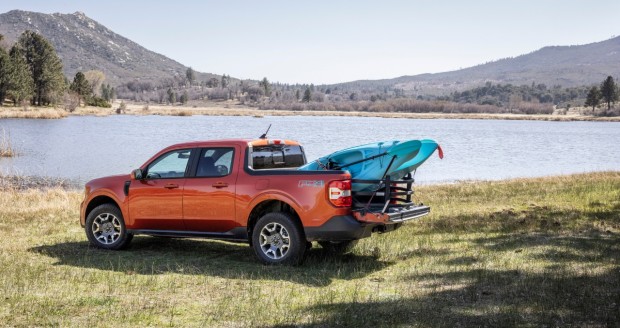
Cleverest Truck for City Dwellers: Ford Maverick
A car-based truck sounds problematic for self-proclaimed “truck guys" fawning over lift kits, winches, and brush bars before driving to work in the morning, but really, what’s a truck for? That’s clearly what Ford designers asked themselves when they created Maverick, a near-perfect five-seater with a 4.5-foot bed that can swallow over a dozen sheets of 4x8-foot drywall when you flip down the tailgate. The average homeowner just isn’t hauling more than that—or towing over 4,000 pounds.
Want fuel economy? Get the Ford Maverick Hybrid, which delivers a combined 37 mpge. While Maverick defaults to front-wheel drive, AWD models are available, too, though only with the non-hybrid powertrain. Still, Maverick remains shockingly affordable, starting at roughly $24,000, and you can get AWD and a bunch of goodies at about $32,000.
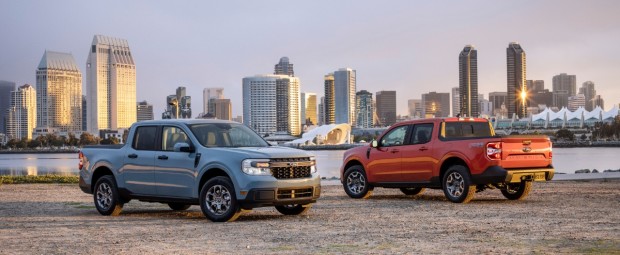
Look at the rest of this list (save for Nissan Frontier) and you’re eyeing a bunch of trucks that'll dent your 401k, or at best, saddle you with years of payments. Maverick is the exception, and it’s no wonder that several 2023 iterations are entirely sold out.
Sure, there’s one thing we’d like to see next: A plug-in version of Maverick. That would likely qualify for federal tax credits, and with a decent-sized battery would even allow light-duty job site power. Like Toyota’s RAV4 Prime, we bet that would run closer to $40K—but a sweet little truck that could roll carbon-free around town and power all our toys at the campsite? Sign us up!
[From $22,595; ford.com]
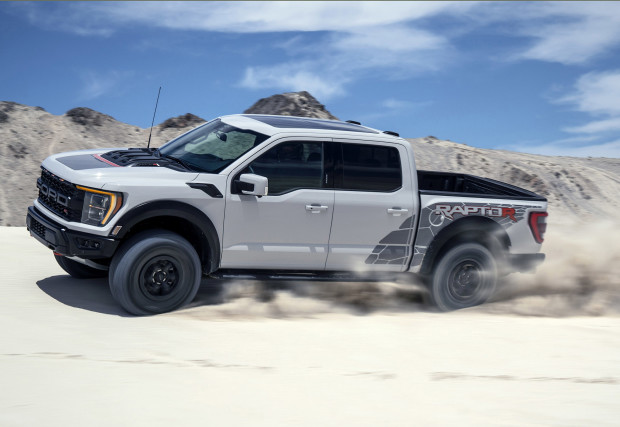
Courtesy Image
Baller Off-roader: Ford F-150 Raptor R
There are all sorts of reasons not to want the Raptor R. And we don’t mean the $109K sticker, nor the abysmal 10 city/15 highway fuel economy that the EPA says eviscerates $4,300 per year in annual fuel costs and plows 12.3 tons of greenhouse gasses into the atmosphere annually.
Yes, we point this out because even a relatively handy 4x4 V-6 Ford F-150 with 18 city/24 highway economy spews just about half that. You have to want an F-150 Raptor R. Truly, its very best use case is if you live at the edge of nowhere and live to four-wheel. Otherwise it’s strictly for posing—and Rivian is way better for the planet if that's your greater concern.
Related: The Best Side-by-Side UTVs of 2023
That said, Raptor R wins in this slot because it's massively capable on dirt. One feature, called Trail Turn Assist, uses ABS to grab the inside rear wheel—like a slow-speed version of e-braking around a corner. Another system called Trail 1 Pedal Drive emulates what’s now pretty standard with EVs, where lifting off the throttle engages maximum regen. Here, lifting engages the brakes, enabling extra precision, especially while rock crawling. Specs-wise, 13.1 inches of ground clearance, a 31-degree approach/23.9 departure angle all best almost anything nearish (save R1T), including Toyota’s TRD Pro Tundra.
Plus, Ford’s taking a page out of Rivian’s book by using multiple cameras to give you just about every exterior angle you’d need for plowing along the trail and aligning a tire over a boulder precisely. It’s a super smart use of tech so your Ford dinosaur can crawl along safely. Although you can thunder around with the exhaust note on full blast, Ford smartly allows you to dial that volume down to ultra-mute—because even if you think it’s cool to wake the neighbors, a loud exhaust is pretty fatiguing for the driver.
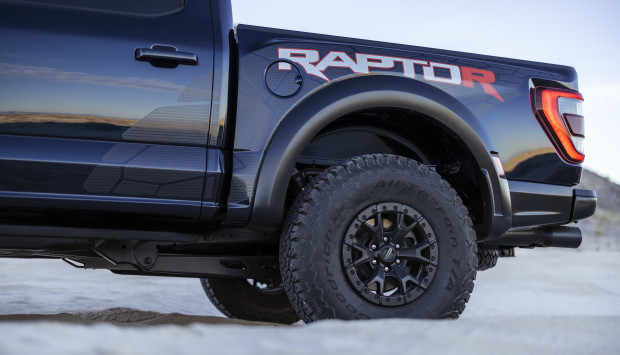
Courtesy Image
Raptor R’s interior is also exceptionally gilded. There are Recaro seats with unique Raptor logos, and the headrests incorporate their own speakers—part of a stellar, 18-speaker B&O sound system. Ford gifts this buyer with dedicated switches and dials for controlling all the off-road functions, auxiliary cornering lighting, and so on. Any serious 4x4 artist should be thrilled with all this jewelry, which allows for very precise control when pushing the very high capabilities of Raptor R.
Related: Ford’s Bronco Raptor Is Its Wildest 4x4 Yet
On more reason why Ford’s here (and not, say, the very fast and impressive Ram TRX): It’s a kitten on the pavement. That Ram is darn near as fast and also just as fuel-inefficient, but it’s turned up to 11/10ths all the time. Raptor R is easy to baby around town, with good on-center steering, comfy highway stability, and other model citizen traits. If you need a pickup that’s as expensive as a BMW M3 Competition—and nearly as quick in a straight line—here it is.
[From $76,775; ford.com]
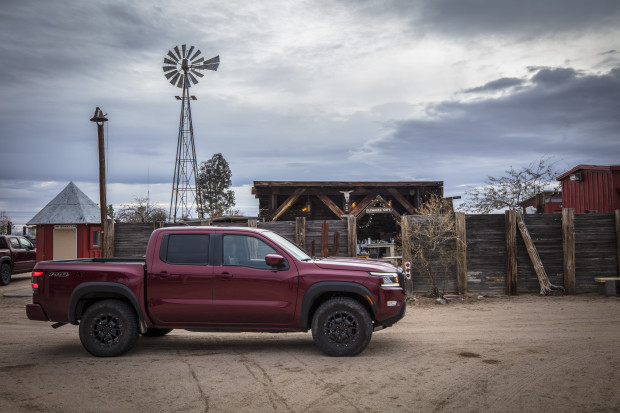
Courtesy Image
Budget 4x4: Nissan Frontier Pro-4X
If you read our review of the 2023 Nissan Frontier Pro-4X, you already know we think very highly of this truck. Here’s why it edges out Toyota Tacoma in TRD Sport or TRD Pro trim: cost. This is the budget 4x4 category, not the spend-over-$50K-to-conquer-the-backcountry section.
TRD Pro can even be had from the factory with a special lift kit that raises it to 11.1 inches of ground clearance, resulting in a 32-degree approach/35-degree departure angle if you get the TRD Off Road model. Compare that to Nissan, with its 32.3-degree angle approach, but 23-degree departure, and 9.4 inches of ground clearance and you’re already thinking it’s wanting.
More to the point, you’re getting out the door at $40,235, vs. over $50,000 for Tacoma.
Then there are the basic attributes of Frontier Pro-4X, starting with its exceptionally smooth-running, 310-horsepower V-6 and nine-speed automatic vs. Toyota’s fairly antique six-speed mated to its less-potent 278 hp V-6.
The cabin is where Nissan takes the lead. It’s got just the right mixture of analogue, with hard controls, buttons, knobs, and dials blended with tech, like Apple CarPlay/Android Auto in the nine-inch touchscreen display. More critical is the view from the driver's seat. Nissan has made sure that for a rock crawler or just a parking family hauler, Frontier delivers easy sightlines through a more generous greenhouse.
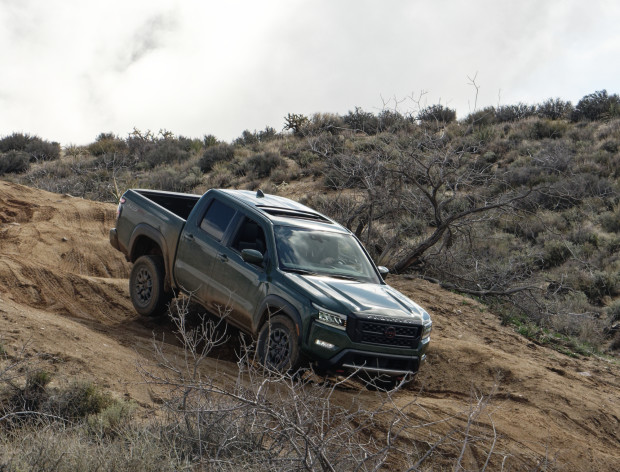
Michael Frank
Nobody hunting for a relatively affordable midsize truck is going to use it solely for 4x4ing. It’s their daily grocery-getter 90 percent of the time, and because seat height as well as rake has been dialed and is easy to adjust, this cabin is a swell place for doing the business of driving.
Add in a dedicated low range, a lockable rear differential, meaty 17-inch off-road rubber (that surprisingly wasn’t too noisy on the highway) and excellent Bilstein dampers, and you have the makings of a stellar off-roader that won’t burst your piggy bank. Yes, there are Jeeps that can do more, but that’s not the point. The value for money play is, and that’s why Nissan takes the checkered.
[From $29,370; nissanusa.com]
3 Trucks to Watch in 2024
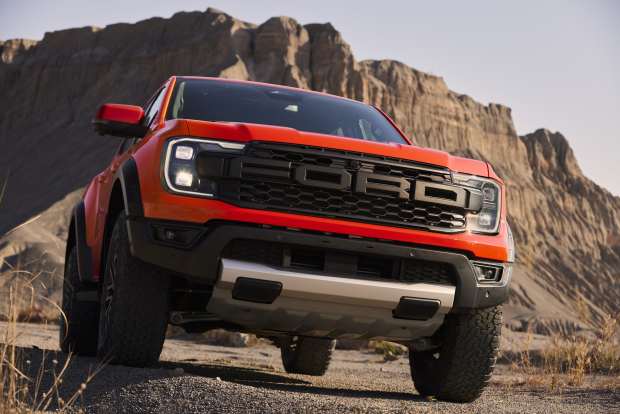
Courtesy Image
2024 Ford Ranger and Raptor Ranger
Ford dominates this list because it's put a lot of chips forward, and F-150 is the cash cow for the Blue Oval. But Ford has also had a hiccup in its strategy in the form of its Ranger. Loyalists held on for the return of this midsize truck after it discontinued sales here in 2012 (while carrying on overseas).
In 2019, Ford picked up the thread at last, but Toyota’s Tacoma still dominates the midsize segment that Ford vacated for so long. With a new Ranger coming, Ford looks to yank back a mantle it held for ages. We’ll get a clearer picture of what’s coming in about a month at a media release, but for now here's what's in our crystal ball.
It's a base Ranger that leans on the 2.3-liter inline-four shared with the Bronco makes the most sense here. Expect roughly the 270 horsepower and 310 lb-ft of torque that matches the current Ranger. An EcoBoost 3.0-liter, twin-turbo V-6 powers higher trim Rangers overseas, and it’s a smart bet that 392 hp mill is what we get.
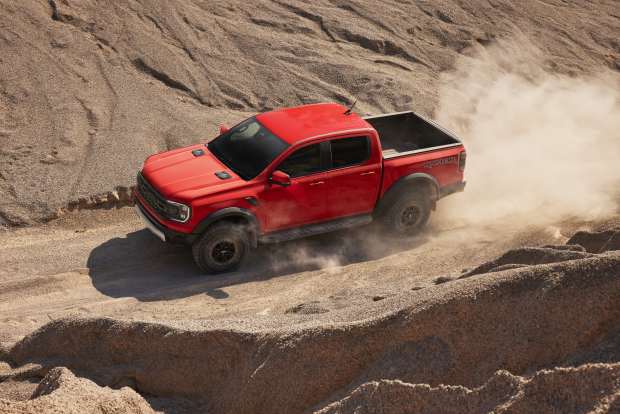
Courtesy Image
What about a Ranger Lightning EV? Probably, but first it makes sense with Ford’s strategy to begin with a hybrid—since a hybrid and probably a plug-in are both due for the Bronco. Plus, Toyota’s strategy is all about hybrids and plug-ins and Ford has to chase the segment leader, Tacoma.
Speaking of Toyota, Ford may use the Raptor name for its off-road-specific midsizer, but instead of a desert runner, chasing Toyota’s TRD Pro rock crawler makes more sense. As such, it’s again wise to look at what Ford does overseas—selling a seriously capable Raptor Ranger in Australia. That truck comes with full-time AWD; a dedicated low range; electronic terrain modes; front and rear differential locking; and multi-mode, electronically switchable 2.5-inch shocks developed by Fox Racing Shox.
For the standard Ranger, customers may also want Ford to give more bed options, including a long bed plus a crew cab, which you can’t get on the current Ranger. With the midsize segment heating up, that could be smart for Ford to sell.
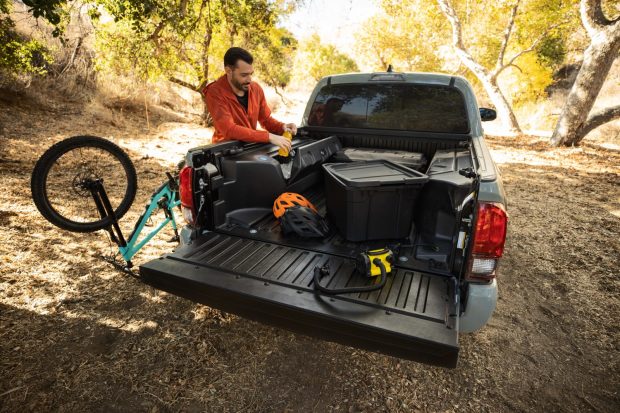
Courtesy Image
2024 Toyota Tacoma
The last time Toyota updated Tacoma it felt like it had been a century since it'd done so. Once again, we’re approaching nine years since that 2015 do-over. Do we know when Toyota’s updating its midsize category king? Nope, but the rumor mill is running overtime and most guestimates put money on early 2024 or thereabouts.
Why this imminent? Because all its rivals are offering a lot more. Just look at transmissions alone, where Tacoma soldiers on with a six-speed while all its peers are at eight gears or higher. Note there’s no Tacoma on our above list, and that’s because today’s Tacoma, while rock-solid and good at many things, is a serious laggard when it comes to ride comfort, interior comfort, and daily driver amenities. This is a common enough critique on forums far and wide, so you can bet that Toyota will thoroughly revamp Tacoma's cabin tech, seating comfort, and sightlines as much as possible.
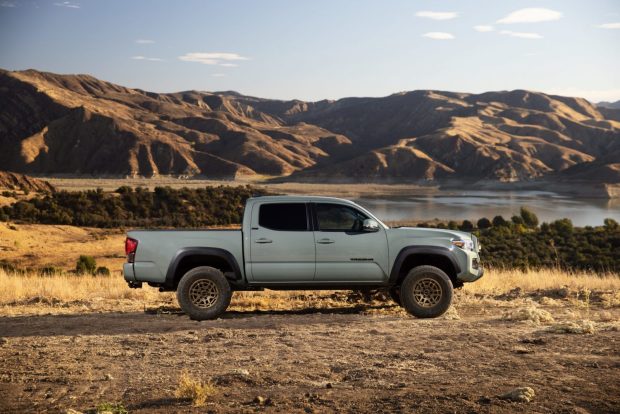
Courtesy Image
As for power, Highlander uses a 2.4-liter inline-four, and that crossover’s scale means that engine would likely tuck in easily for the shape of the new Tacoma. It’s less clear what hybrid powerplant Toyota might use, but this is a company with more experience in hybrids than any other on the planet, so there’s zero reason to doubt Toyota will get this part right. A plug-in hybrid could even come eventually, like we now see with RAV4 and beyond.
Toyota’s already announced plans to move Tacoma to a new chassis, one shared with Sequoia and 4Runner. A bigger question is whether it’ll ditch its solid rear end for coils, like Tundra. That would easily vault the midsizer back to the top of the heap for handling.
Toyota may also want to chase some of what Jeep has going with its Gladiator, with perhaps disconnecting sway bars and a seriously lifted version of TRD Pro—because why leave all that cash to the aftermarket? As for an EV Tacoma? Maybe. Considering how much better Tacoma sells than the full-sized Tundra, why leave the EV truck segment to the big-three American makes? That probably won't happen until 2025 at least.
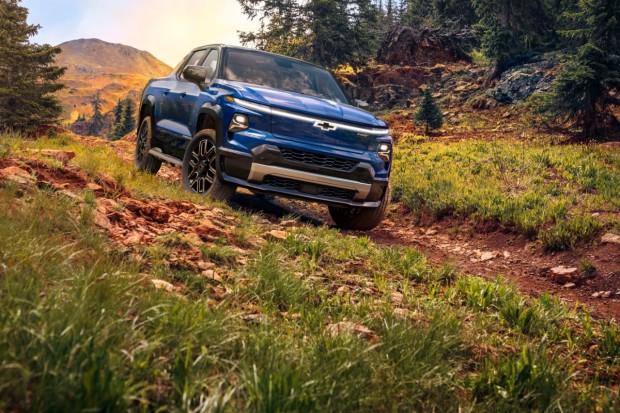
Courtesy Image
2024 Chevrolet Silverado EV
With Ford’s Lightning and Rivian having a big lead on GM’s EVs, it’s super important that Chevy strikes back with Silverado. At least from the teases we’ve seen, we’re expecting nothing but goodness.
Consider up to 400 miles of range per charge and DC fast charging at rates up to 350kW. That's at the upper level of what we’re seeing from the best EVs and will juice at the rate of 100 miles per 10 minutes. Chevy also intends to allow shore power to up to 10 wall-style plugs anchored at a few locations on the truck—for powering anything from shop tools at a job site to lighting a campsite, and of course running your fridge or A/C during a power outage. The Silverado EV will run on the same Ultium scalable battery architecture that’s used for the very impressive Hummer EV. Expect a starting price closer to $50K, which is about half of what that GMC Hummer runs.
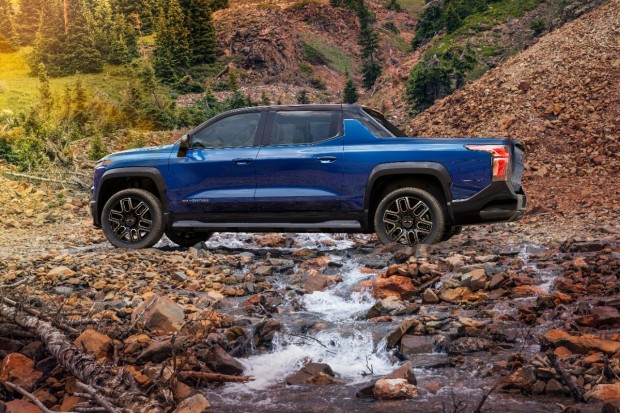
Courtesy Image
While launch models will get tricks like four-wheel steering, we’re more impressed that Chevy’s bringing a flip-down mid-gate to one of those—the RST. While the standard bed length on that sportier truck stretches just shy of six feet, opening that door to the cabin allows carting nine-foot-long loads with the tailgate locked. There’s a lot we still don’t know, but Chevy’s said one of the two launch editions, the WT (for work truck), will churn out 510 hp and 615 lb-ft of torque, and allow 8,000 pounds of towing. Eventually, GM will sell a work version with up to 20,000 pounds of towing.
Related: Chevrolet Colorado ZR2 Pickup Is a Desert Monster
While Chevy’s saying Silverado’s four-wheel independent air suspension will allow a lift range of an extra two inches, we’d guess eventual off-road-specific versions will lift a bunch more than that. Chevy’s already talked up a Trail Boss edition, though we haven’t heard much more about what that entails.
from Men's Journal https://ift.tt/IniFMhm
via IFTTT
